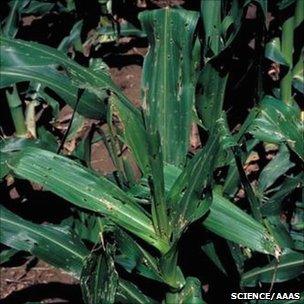GM crops bring cash harvest to non-GM varieties
- Published

The corn borer can devastate plants, but GM varieties produce a defensive bacterial toxin
Insect pest control by genetically-modified crops can raise yields and profits from non-GM varieties grown nearby, a study from the US indicates.
Researchers looked at maize grown in five US states, where plants are affected by the European corn borer.
They found fewer borers - and higher profits - in GM fields, and in neighbouring non-GM fields.
Writing in the journal Science, they say this is the first time that a wider impact on profits has been shown.
Maize (known as corn in the US) can be genetically modified with a gene taken from a bacterium, Bacillus thuringiensis (Bt).
The introduced gene makes a toxin that kills corn borers - in principle rendering the plants immune to its attack, and increasing yields.
Bt varieties now make up about two thirds of the US maize crop.
But regulations require farmers to plant conventional varieties as well, which is intended to stop the borers becoming resistant.
Previous research has shown that Bt plants can curb insect damage in neighbouring non-GM fields, because their presence reduces the overall number of pests.
"This area-wide suppression effect has been documented in China and here in the US," said study leader Bill Hutchison from the University of Minnesota in St Paul.
"But as far as I'm aware, this is the first time that the economic benefits have been documented," he told BBC News.
Conventional economics
By comparing actual insect damage against estimates of what damage would have occurred - derived from historical data and other measures of borer abundance - the researchers calculated that over the 14 years of their study, use of Bt varieties improved farmers' profits by about $3.2bn in Illinois, Minnesota and Wisconsin.
But most of this benefit - $2.4bn - was accrued in non-Bt fields.
Non-Bt seeds are cheaper - but they also gained in yield through their proximity to the GM fields.
A similar pattern pertains in Iowa and Nebraska, the team calculates.
Professor Matin Qaim, who studies the economics of GM agriculture at the University of Goettingen, said the ecological and economic benefits would depend on the characteristics of the particular pest.
"If your crop plant is the main host for the insect, then area-wide suppression is likely to happen," he said.
"Resistance might develop - however, that hasn't become a big problem under practical conditions."
Rotating benefits
A certain amount of maize grown in the US - and a larger proportion in other countries - is grown using organic techniques; and Bill Freese of the anti-GM group Center for Food Safety noted that other forms of pest control were available.
"Organic farmers use a lot of cultural techniques to combat insects, such as crop rotation, and that's very beneficial," he said.

Populations of European corn borer are declining across the US, largely because of Bt crops
"But in most of these mid-western farms there is hardly any crop rotation - the most you might get is corn-soy-corn - so these cultural methods are being forgotten, and I think that's a shame."
The Environmental Protection Agency (EPA) mandates that at least 20% of non-GM varieties must be planted alongside the Bt strains.
But recently, companies have released "stacked" varieties containing up to six introduced genes, each producing a toxin to a specific pest; and for these, the EPA is relaxing the requirement for non-GM refuges.
However, Professor Hutchison said his work might convince previously reluctant farmers that the conventional seeds should be sown even if regulations do not mandate it.
"Many growers are very smart, they see the suppression in their [non-GM] fields," he said.
"It depends how risk-averse they want to be; but in the modern climate, with fewer corn borers around, it clearly makes economic sense to increase the proportion of non-Bt strains."
Richard.Black-INTERNET@bbc.co.uk
- Published14 September 2010
- Published6 August 2010